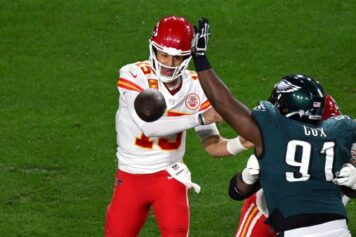NFL fans sat mesmerized on a Sunday night in late January when they saw a quarterback duel for the ages.
Josh Allen and Patrick Mahomes combined to throw for seven touchdown passes and 707 yards passing yards, yet fans voiced the ending was imperfect because in overtime Allen sat on the bench and watched Mahomes throw a game-winning touchdown pass.
Big fans of the new overtime rule. 😅#GoBills | #BillsMafia pic.twitter.com/sUjBngolGY
— Buffalo Bills (@BuffaloBills) March 29, 2022
The NFL had sudden death overtime until 2010, when it altered the rules. During the past decade, the playoff overtime rules stated only a touchdown on the first possession would end the game.
Fans had enough of this overtime rule because the team that won the coin toss still won a majority of time in the playoffs (10-2). NFL Commissioner Roger Goodell described how the league listened to the frustrated fans, with the league’s owners approving of a new overtime rule.
“We’re always looking to improve and I think what really drove the decision was the database, ultimately, and looking at the facts and what’s happened,” Goodell said. “Where we saw that most having an influence, I think, was 12 games in the postseason that have been in overtime, seven of which were won on the first possession. When you see that, that’s the type of thing that I think our coaches and everyone looked at — this is an issue in the postseason we should deal with.”
Now, under the new playoff overtime rules, both teams will have an opportunity to possess the ball, unless the initial team that kicked off scores a safety. Under those circumstances, the team forcing the safety would win the game.
🚨 NEW PLAYOFF OVERTIME RULES 🚨 pic.twitter.com/OMJ0cYSih1
— NFL (@NFL) March 29, 2022
Making The Game More Fair?
The evidence shows winning the toss does give a team an advantage. Out of the 12 overtime playoff games, seven of them ended in one possession. That overtime format era has officially come to an end, but despite the unpopularity it provided for memorable moments.
Football is a tough sport. Two teams prepare for a whole week for a single matchup and have 60 minutes to decide a winner. On top of that, the NFL playoffs are intriguing because each game is a sudden death.
The road teams have everything going against them, but they still have a winning record in the previous overtime format. To prolong a game because “it was not fair” does not justify allowing both teams a possession.
For a team to win using the previous format, they were tasked to go roughly 75 yards and score a touchdown.
Offenses have been at times unstoppable with recent quarterback play, but during the past decade, scoring an overtime touchdown on a drive is not guaranteed because defenses often step up to the challenge of the moment.
There was extreme urgency for the defense to make a stop, but under the new format their urgency level has significantly dropped.
The NFL continues to make changes that help the offense and hurt the culture of how defenses handle their business. Now a defense could give up a touchdown in overtime without deep concern because they know their offense gets the ball back.
Real Rule Change: Pass Interference
If there are going to be more offensive possessions then the least the NFL could do to help the otherside of the ball is change the pass interference rule.
The spot foul has a bigger impact on the game than any overtime format.
Case in point is Super Bowl 56, when Logan Wilson was called for pass interference in the red zone as he was guarding Cooper Kupp. The Los Angeles Rams had new life with the call and utilized the clock to leave little time for the Bengals.
This will be my only tweet about the game. Logan Wilson is going to be remembered for this flag, when in reality if this goes our way he’s looking at a possible Super Bowl MVP. The dude was unreal last night and I will never EVER forget that. pic.twitter.com/A2kp9xh6sv
— Logan Fulmer (@Fvlmer) February 14, 2022
A linebacker had great coverage on one of the best receivers in the NFL and instead of making a play to be remembered in Super Bowl history it is now a what-if. The NFL has tried to make pass interference reviewable, but it failed and only lasted one season. The rule alteration is simple, follow college football and only make pass interference a 15-yard penalty.
If we keep giving offenses the advantage eventually the NFL will become two-hand touch.
https://twitter.com/winn_dynasty/status/1508967762928050177?s=20&t=ZNJw3ZqEUgmYUvnQ-wJc1w



